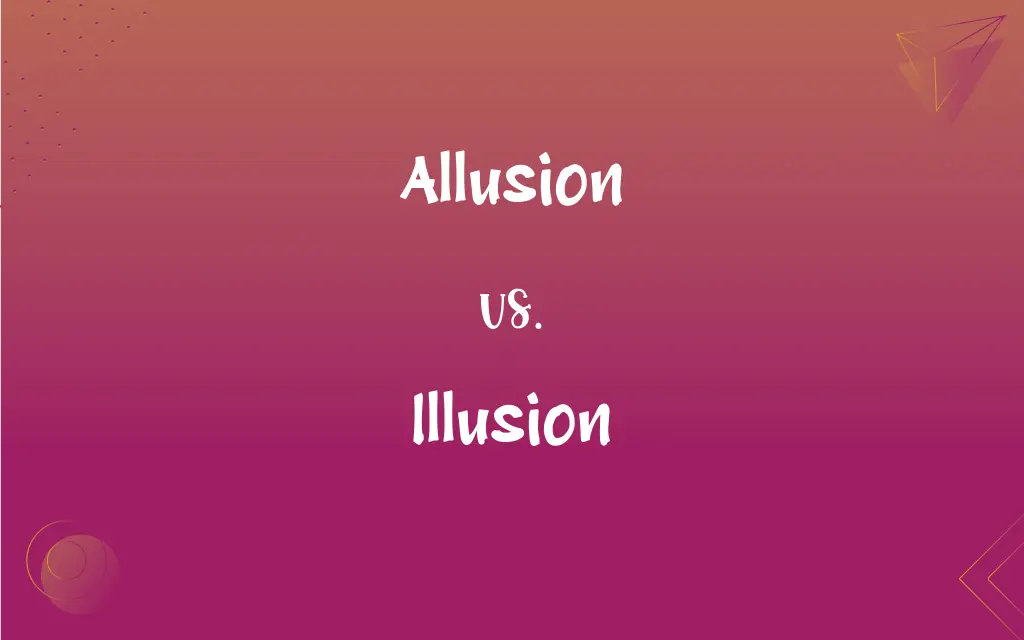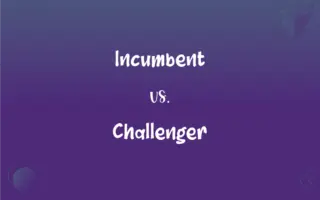Allusion vs. Illusion: What's the Difference?
Edited by Aimie Carlson || By Janet White || Published on November 1, 2023
Allusion is a subtle reference to something, while Illusion is a false perception or deceptive appearance of reality.

Key Differences
Allusion and Illusion, though phonetically similar, diverge significantly in meaning. An Allusion is a brief and indirect reference to a person, place, thing, or idea of historical, cultural, literary, or political significance that is not elaborated on. Writers often use Allusion to let readers make connections without explicitly stating those connections. On the other hand, Illusion pertains to a misrepresentation of a “real” sensory experience. It's an instance where the brain perceives things differently from how they truly are.
When an author makes an Allusion to Shakespeare in their writing, they are assuming the reader recognizes the reference and its significance, without needing a detailed explanation. This Allusion can add depth and resonance to their work. Conversely, an Illusion can be a visual trick, like a mirage in the desert or a magic trick where something appears different than it really is. It fools the senses into believing something false.
Considering the realm of art, an Allusion might be present in a modern painting that subtly references a classic work, expecting viewers to recognize the homage. An Illusion, however, might be seen in optical art, where patterns and design deceive the eye into seeing movement or three-dimensionality where none exists.
Both Allusion and Illusion enrich language and expression in unique ways. Allusion adds layers of meaning through indirect reference, enriching comprehension for those who catch its subtle hint. In contrast, Illusion plays with our senses and perceptions, often challenging or surprising us with its departure from reality.
Comparison Chart
Definition
An indirect reference.
A deceptive appearance or false perception.
ADVERTISEMENT
Nature
Literary or artistic device.
Sensory misinterpretation.
Usage
Assumes audience's familiarity with the reference.
Manipulates the viewer's or listener's senses.
Example
Referring to mythology in a novel.
Optical tricks in art.
Context
Cultural, historical, or literary reference.
Visual, auditory, or sensory deception.
Allusion and Illusion Definitions
Allusion
An expression designed to call something to mind without mentioning it explicitly.
The river in the poem was an Allusion to time.
ADVERTISEMENT
Illusion
A false view or deceptive appearance.
The oasis was merely an Illusion in the desert.
Allusion
An indirect or passing reference.
The superhero's strength was an Allusion to Hercules.
Illusion
A false idea or belief.
He was under the Illusion that she felt the same way.
Allusion
A casual mention of something, generally without going into details.
The film made several Allusions to historical events.
Illusion
A misleading image or impression.
The painting created an Illusion of depth.
Allusion
A literary device used to hint at something without stating it directly.
The novel made an Allusion to classic fairy tales.
Illusion
An erroneous perception of reality
Mirrors gave the illusion of spaciousness.
Allusion
A brief, indirect reference.
His speech had an Allusion to the famous I have a dream speech.
Illusion
An erroneous concept or belief
The notion that money can buy happiness is an illusion.
Allusion
The act of alluding; indirect reference
Without naming names, the candidate criticized the national leaders by allusion.
Illusion
The condition of being deceived by a false perception or belief
Spent months flailing about in illusion.
Allusion
An instance of indirect reference
An allusion to classical mythology in a poem.
Illusion
Something that is erroneously perceived or construed
The animal in the shadows turned out to be an illusion.
Allusion
An indirect reference; a hint; a reference to something supposed to be known, but not explicitly mentioned
Illusion
A fine transparent net fabric, used for dresses or trimmings.
Allusion
A figurative or symbolical reference.
Illusion
(countable) Anything that seems to be something that it is not.
We saw what looked like a tiger among the trees, but it was an illusion caused by the shadows of the branches.
Using artificial additives, scientists can create the illusion of fruit flavours in food.
Allusion
A reference to something supposed to be known, but not explicitly mentioned; a covert indication; indirect reference; a hint.
Illusion
(countable) A misapprehension; a belief in something that is in fact not true.
Jane has this illusion that John is in love with her.
Allusion
Passing reference or indirect mention
Illusion
(countable) A magician’s trick.
Illusion
(uncountable) The state of being deceived or misled.
Illusion
An unreal image presented to the bodily or mental vision; a deceptive appearance; a false show; mockery; hallucination.
To cheat the eye with blear illusions.
Illusion
Hence: Anything agreeably fascinating and charming; enchantment; witchery; glamour.
Ye soft illusions, dear deceits, arise!
Illusion
A sensation originated by some external object, but so modified as in any way to lead to an erroneous perception; as when the rolling of a wagon is mistaken for thunder.
Illusion
A plain, delicate lace, usually of silk, used for veils, scarfs, dresses, etc.
Illusion
An erroneous mental representation
Illusion
Something many people believe that is false;
They have the illusion that I am very wealthy
Illusion
The act of deluding; deception by creating illusory ideas
Illusion
An illusory feat; considered magical by naive observers
Illusion
A perception that does not correspond to reality.
The magician's trick was an impressive Illusion.
Illusion
Something that seems to exist but doesn't in reality.
The water's shimmer was an Illusion caused by the heat.
FAQs
What's the key difference between Allusion and Illusion?
Allusion is an indirect reference, while Illusion is a deceptive appearance.
Can one understand an Allusion without prior knowledge?
Often, recognizing an Allusion requires familiarity with the reference, unlike an Illusion that directly impacts senses.
Can an Allusion be explicit?
By nature, an Allusion is indirect, while an Illusion deceives or misrepresents.
Can Allusion be a form of symbolism?
Yes, Allusion can symbolize something without directly stating it, whereas Illusion deceives perception.
Are optical illusions a type of Allusion?
No, optical illusions are Illusions, misleading the visual sense.
Why do authors use Allusion?
Authors use Allusion to add depth or to let readers make connections, whereas Illusion alters perceived reality.
Can Illusion be intentional?
Yes, Illusions can be intentionally created, like in art or magic, whereas Allusion is a deliberate reference.
Do Allusions require a shared cultural context?
Often, recognizing Allusions benefits from shared cultural knowledge, while Illusion directly impacts perception.
How does culture impact one's understanding of Allusion?
Cultural knowledge can determine whether one catches an Allusion, unlike Illusion which plays with senses directly.
Is a mirage an Illusion or Allusion?
A mirage is an Illusion, a deceptive visual appearance.
In what art form is Allusion common?
Literature frequently uses Allusion, whereas visual arts might use Illusion to play with perception.
Why is it crucial to distinguish between Allusion and Illusion?
Understanding the difference enriches comprehension: Allusion adds depth through reference, while Illusion challenges perception.
Are dreams considered Illusions?
Dreams can be viewed as Illusions since they present an alternate reality, differing from the indirect nature of Allusion.
Are hallucinations a type of Illusion?
Yes, hallucinations can be considered Illusions as they don't represent true reality.
Can Allusion be unintentional?
While Allusion is typically deliberate, unintended Allusions can occur, unlike Illusion which directly alters perception.
Is it possible to see through an Illusion?
Yes, with knowledge or awareness, one might recognize and see past an Illusion, unlike Allusion which subtly hints at a reference.
Can technology create Illusions?
Yes, technology can produce Illusions, like virtual reality, differing from Allusion's indirect references.
Why might a speaker use Allusion?
A speaker might use Allusion to hint at something without stating it directly, whereas Illusion affects how something appears or sounds.
Can Allusion be in spoken language?
Yes, spoken words can contain Allusion, indirectly referring to something, while Illusion affects direct perception.
Can Illusions be auditory?
Yes, auditory illusions mislead hearing, distinct from Allusion's indirect referencing.
About Author
Written by
Janet WhiteJanet White has been an esteemed writer and blogger for Difference Wiki. Holding a Master's degree in Science and Medical Journalism from the prestigious Boston University, she has consistently demonstrated her expertise and passion for her field. When she's not immersed in her work, Janet relishes her time exercising, delving into a good book, and cherishing moments with friends and family.
Edited by
Aimie CarlsonAimie Carlson, holding a master's degree in English literature, is a fervent English language enthusiast. She lends her writing talents to Difference Wiki, a prominent website that specializes in comparisons, offering readers insightful analyses that both captivate and inform.






































































